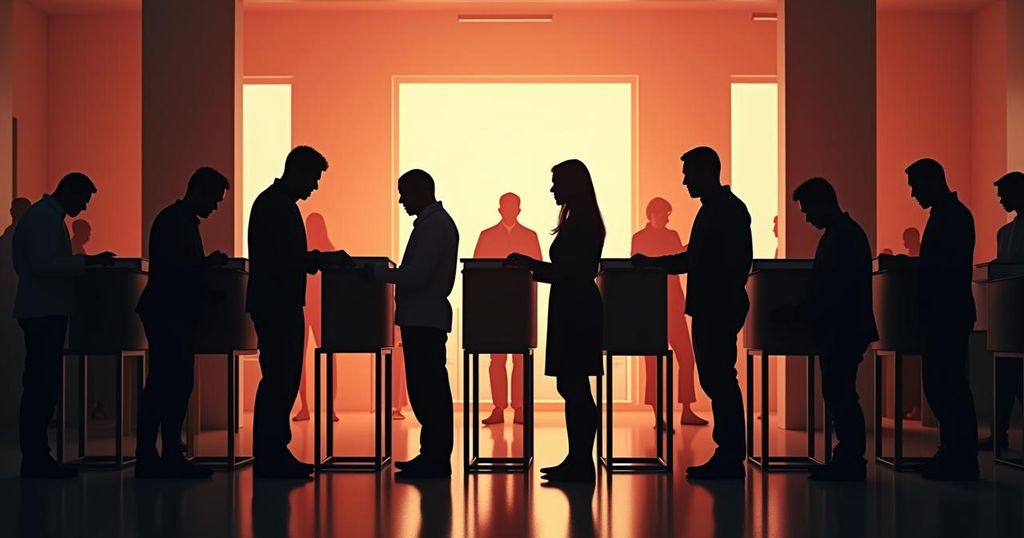Tunisia Goes to the Polls Amidst Political Repression and Economic Struggles

Tunisian voters participated in an election likely to secure a second term for President Kais Saied, amidst a backdrop of political repression and economic challenges. Critics of Saied have been imprisoned, creating questions about the fairness of the election process. This race marks a significant moment as it reflects the current state of Tunisia’s democratic practices and public sentiment towards Saied’s governance since consolidating power. The economy, marked by high unemployment and stagnant growth, adds urgency to the electoral outcome as many look for a viable path forward amidst political turbulence.
On Sunday, Tunisian citizens participated in an election expected to secure a second term for President Kais Saied, who faces little opposition due to the incarceration of many of his prominent critics, including some political challengers. At 66 years old, President Saied’s campaign is relatively unchallenged as he embarks on a race aimed at reaffirming his power, following significant political maneuvers in recent years that included suspending parliament and modifying the constitution to enhance presidential authority. This election marks a significant milestone, being the third since Tunisia emerged from the 2011 protests that resulted in the ousting of longtime autocrat Zine El Abidine Ben Ali, a key figure in the Arab Spring—a movement credited for toppling several Middle Eastern leaders. Although international observers previously deemed past elections in Tunisia as legitimate, concern looms over the fairness of this election amidst a crackdown on dissenting voices and opposition parties advocating for a boycott. Historically perceived as the Arab Spring’s only triumph, Tunisia has witnessed its democratic foundations struggle against a backdrop of economic challenges, political strife, and episodes of violence. President Saied’s ascent to power in 2019 stemmed from a promise to revitalize the nation, targeting youth empowerment and decentralized governance. However, this election will be pivotal in assessing public sentiment regarding the erosion of democratic practices since Saied’s controversial consolidation of power initiated in July 2021, followed by a low-turnout referendum that favored Saied’s new constitutional framework. Out of several candidates who aspired to challenge him, only three have been permitted to run: President Saied, Zouhair Maghzaoui—an experienced politician critical of Saied’s policies, and Ayachi Zammel—a businessman with an ongoing criminal case connected to election irregularities. The election authority’s previous rejection of multiple contenders raises questions about genuine political competition. The economic landscape continues to be distressing, as rising unemployment rates and slow recovery from the COVID-19 pandemic hinder Saied’s efforts to revitalize the economy. Negotiations for an International Monetary Fund bailout remain stalled due to Saied’s reluctance to meet necessary reform conditions. Furthermore, the precarious economic situation has triggered an increase in unauthorized migration attempts to Europe, while tensions with sub-Saharan migrants have escalated, resulting in harsh rhetoric and violence against these communities. On an international scale, Tunisia maintains ties with Western allies while exploring partnerships with countries like Iran and China, emphasizing its sovereignty in migration matters. President Saied’s administration has been vocal in its stance on regional issues, particularly supporting Palestine while opposing normalization with Israel.
Tunisia is recognized as the birthplace of the Arab Spring, demonstrating the potential for democratic reform in the region. However, its democratic environment has increasingly deteriorated under President Kais Saied’s administration, which has garnered criticism for cracking down on dissent and consolidating power at the expense of democratic institutions. The political landscape has witnessed significant turmoil with ongoing arrests of opposition leaders and a disenchanted populace grappling with economic challenges that have eroded confidence in the government. The implications of these dynamics are pivotal for both domestic stability and international perceptions of Tunisia’s political trajectory.
In conclusion, the upcoming presidential election in Tunisia serves as a critical indicator of the country’s political climate and the resilience of its democratic fabric. While President Kais Saied appears to possess considerable support, concerns regarding the electoral process and significant political repression raise questions about the legitimacy of his potential reelection. The interplay of economic hardship, migration issues, and the reassertion of authority under Saied’s government will undoubtedly shape Tunisia’s future in both domestic and global contexts.
Original Source: www.cnn.com







